CIMC Mobile Cold Storage Containers Become the "New Favorite" in the Cold Chain Logistics Market
2019-04-24
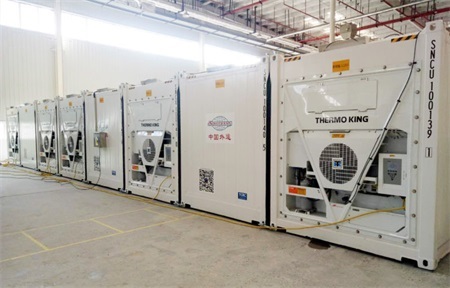
In March of this year, the Government Work Report of the State Council highlighted the need to reduce costs in areas such as logistics and to step up investment in logistics and other infrastructure. As a vital component of logistics infrastructure, cold-chain logistics warehousing is now drawing attention from various sectors. To seize market opportunities, CIMC has recently invested heavily in intensive research and development, successfully creating several nationally first-of-their-kind mobile cold-storage container products. These innovative solutions have already proven their functionality in the market and have quickly become the "new darlings" of the cold-chain logistics industry.
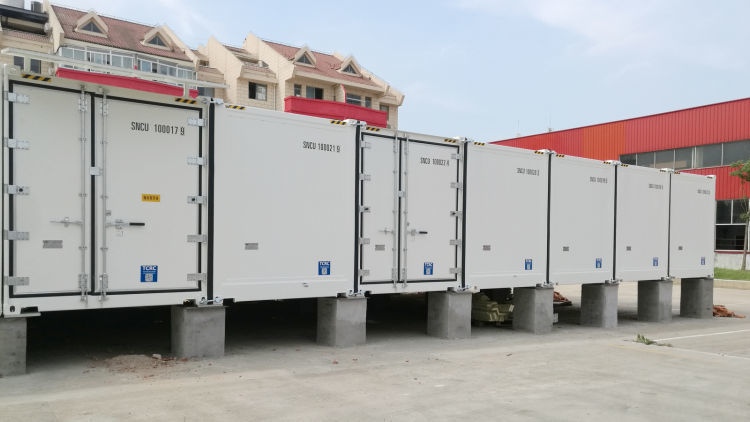
Cold-chain logistics demand surges as urban cold storage facilities shift closer to the consumer end.
In recent years, with the growing popularity of online shopping and the rise of new retail models, people's lifestyles and consumption patterns have undergone significant changes. Online grocery shopping and home-delivered fresh produce have become increasingly popular consumer trends today. According to data from relevant institutions, China's fresh e-commerce market reached approximately 139.13 billion yuan in 2017, surpassing 100 billion yuan for the first time, representing a year-on-year growth of 59.7%. In the first half of 2018, the transaction volume of fresh e-commerce platforms totaled 105.16 billion yuan.
"Benefiting from the growth in this type of consumption, coupled with the government's policies aimed at vigorously promoting the development of cold-chain logistics, China's domestic cold-chain logistics market has experienced rapid expansion in recent years. It is precisely because of the booming opportunities created by the thriving cold-chain logistics sector that well-known enterprises across various industries—such as Sinotrans, SF Express, Suning, JD.com, Meituan, and Ele.me—have already begun to strategically position themselves in this space." A relevant official from Taicang Cold Box, a manufacturer under CIMC specializing in mobile cold-storage containers, noted, "The most concentrated applications are found in areas like fresh produce and fruits/vegetables, where consumers have exceptionally high expectations for product quality. Only cold-chain logistics can effectively meet their demands for freshness preservation and efficient transportation."
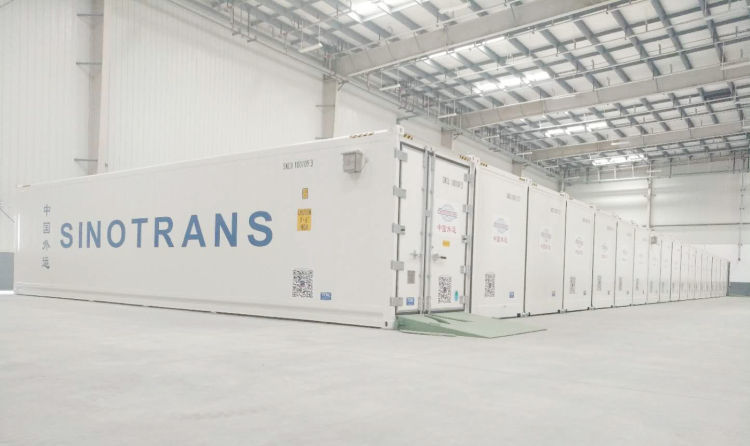
Currently, most fresh-food e-commerce platforms still rely on a "two-stage" semi-cold-chain logistics model for delivery—leveraging inter-city cold-chain transportation as the backbone, using urban cold storage facilities as key nodes, and supplementing with insulated vehicles like refrigerated trucks to ensure door-to-door delivery. However, delivering directly to households via specialized refrigerated vehicles proves cost-prohibitive when dealing with scattered residential buildings and small, individual orders. In the wave of New Retail, many fresh-food companies are now experimenting with innovative approaches: by setting up pre-positioned warehouses and expanding their physical store networks, they aim to create a "point-to-area" distribution system, covering a three-kilometer radius. Ultimately, last-mile deliveries can be handled efficiently by using ice packs to maintain products at low temperatures, significantly reducing the ongoing refrigeration costs associated with traditional cold-chain logistics.
"Among these, urban cold storage facilities serving as city logistics hubs for cold-chain transit and warehousing are seeing steadily increasing demand year after year. However, traditional brick-and-mortar cold storage facilities not only tend to be located farther from city centers but also require substantial land areas, involve significant capital investments, and take a long time to construct. Moreover, they face numerous challenges in terms of environmental protection and safety, making their development increasingly difficult. As a result, the growth of this sector is encountering mounting obstacles," said the official. "Facing these developmental hurdles, major fresh-food e-commerce platforms have begun exploring the next frontier in urban cold-storage solutions: setting up pre-positioned cold storage facilities in areas closer to city centers, aiming to enable short-distance, efficient delivery networks."
China International Marine Containers (CIMC) is deeply investing in cold-chain logistics equipment, with several products becoming industry "hot commodities."
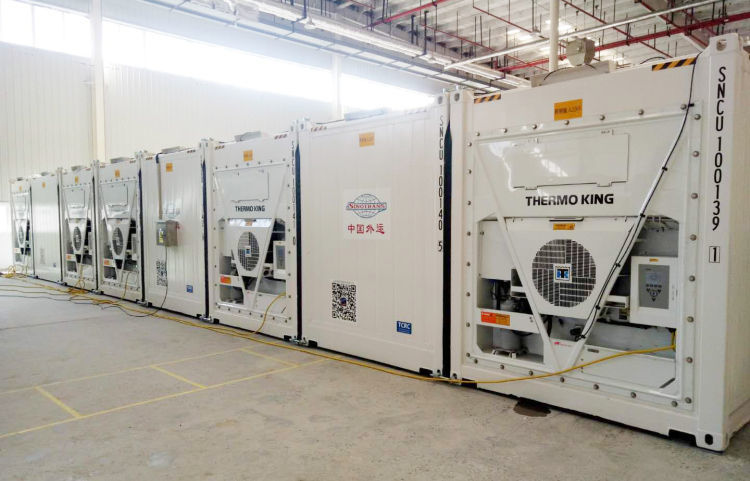
Against this backdrop, starting from 2015, enterprises under CIMC, such as Taicang Refrigerated Container, have pooled their R&D resources to develop the country's first mobile cold storage container designed for large-scale use in building cold-chain logistics warehouses—and launched it onto the market in 2016. Whether used as urban cold storage facilities or front-end cold storage solutions, this product boasts unique advantages. Combined with a flexible mechanism that enables rapid responses to customer needs, it has been warmly embraced by clients like Meituan and Ele.me right after its introduction. Today, the product already enjoys a commanding lead in market share.
According to technical experts from Taicang Cold Box, this mobile cold storage unit is designed and manufactured in accordance with standard refrigerated container specifications. It’s a compact, easy-to-disassemble cold storage system that can be easily assembled into multiple units. Specifically, it can be mass-produced in factories and efficiently transported via standard modes of transportation—such as road or rail—to the installation site. Once on-site, the unit can be customized to meet customer needs by combining different functional and modular components, enabling capabilities like quick-freezing, rapid pre-cooling, cooling, and refrigeration. During operation, customers can flexibly adjust the number and types of module units at any time based on evolving requirements, allowing them to expand, reduce, or reconfigure the system as needed. This ensures that the cold box maintains its intended functionality and performance standards. Moreover, when relocating the cold storage facility, dismantling the unit is remarkably simple and swift, making it easy to transport the modules to a new location for immediate reassembly and continued use—without compromising on functionality or quality.
“Currently, a mobile cold storage container typically measures 40-foot standard container size, with an internal volume exceeding 60 cubic meters. However, these containers can be easily combined and integrated into larger units—without the need to equip every single unit with its own refrigeration system. As a result, the combined cold storage capacity can range from 60 to several thousand cubic meters, tailored precisely to meet customers' specific needs. Overall, compared to traditional brick-and-mortar cold storage facilities, CIMC’s mobile cold storage containers offer significant advantages, including lower overall costs, shorter project implementation timelines, greater flexibility and convenience in use, easy disassembly and relocation, as well as recyclability and reusability.” The technician added, “These key benefits effectively address the shortcomings of conventional brick-and-mortar cold storage systems, providing a viable solution to the cold-chain warehousing challenges faced by major fresh-food e-commerce platforms.”
The technician also stated that the steel plates, insulation materials, and other components used in this mobile cold-storage container are all environmentally friendly and green materials vigorously promoted by the national government, eliminating any environmental concerns or the need for an environmental impact assessment. This is also one of the key reasons why it has become highly popular among major fresh-food e-commerce platforms.
"Thanks to our distinct comprehensive advantages, our mobile cold storage containers have been on the market for about two years since their launch in 2016. During this time, they’ve already reached users in more than 30 major cities across China, including Beijing, Shanghai, Shenzhen, Chongqing, Fuzhou, and Dalian—and even exported to markets as far away as Europe and Southeast Asia. Market research indicates that CIMC products currently hold a domestic market share exceeding 95%," said the head of CIMC Taicang Cold Box Marketing Service Department.
In addition, to meet the diverse application needs of the cold-chain logistics market, CIMC has already taken the lead in China by developing multiple models of mobile cold-storage containers, strategically expanding its presence in this growing sector. Among them, Yangzhou Tongli Refrigerated Container Co., Ltd., a subsidiary of CIMC, was the first company nationwide to successfully develop a mobile cold-storage container. Back in 2004, it introduced to the market a mobile unit primarily designed for fresh-food logistics support at airports—and to date, over 10,000 units have been sold. In 2016, Qingdao CIMC Specialized Refrigerated Equipment Co., Ltd., also under the CIMC umbrella, customized and launched a mobile cold-storage container tailored specifically for e-commerce platforms handling fresh produce. This innovative solution has since played a key role in enabling SF Express to efficiently manage the cold-chain logistics of Yangcheng Lake hairy crabs. Furthermore, in 2017, Shenzhen CIMC Cold Chain Technology Co., Ltd., another CIMC subsidiary, unveiled an advanced, intelligent, energy-efficient, and environmentally friendly mobile cold-storage container capable of being easily combined to meet even more demanding customer requirements. This cutting-edge product has quickly garnered significant attention within the industry.
Application scenarios continue to diversify—agricultural product origins, railway cold-chain logistics, and more still hold great potential.
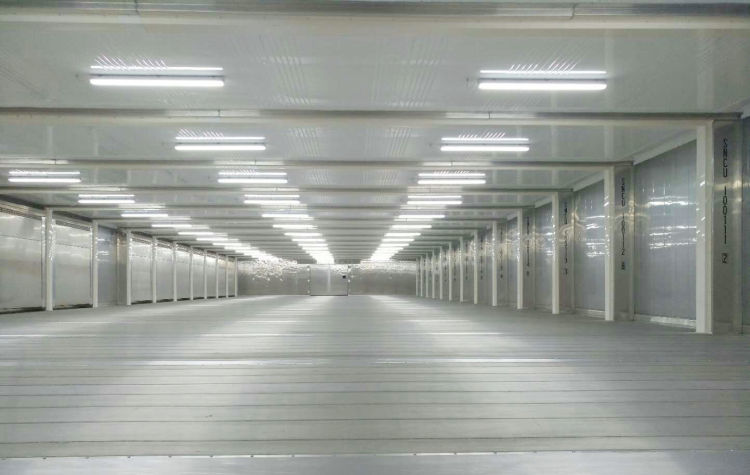
Relevant institutions' research indicates that, over the next 3 to 5 years, China's cold-chain logistics market is expected to reach 470 billion yuan, with an annual compound growth rate exceeding 20%. "CIMC's mobile cold-storage container products have already stood the test of the market and will play a crucial role in the future cold-chain logistics sector," said a CIMC official.
Additionally, to address the contradiction between the rapidly growing demand for cold-chain logistics and the relatively underdeveloped current cold-chain infrastructure, the country has successively introduced relevant policies, vigorously promoting innovation and application of cold-chain logistics technologies and equipment.
In April 2017, the General Office of the State Council issued the "Opinions on Accelerating the Development of Cold-Chain Logistics to Ensure Food Safety and Promote Consumption Upgrading" (hereinafter referred to as the "Opinions"), which clearly stated the need to speed up the phasing out of non-standard, high-energy-consumption cold storage facilities, while encouraging the construction of circulation-oriented cold storage facilities that better meet market demands. The document also promoted the widespread use of convenient and standardized cold-chain transport units, such as refrigerated containers. Furthermore, enterprises were encouraged to adopt safe, environmentally friendly, and energy-efficient refrigerants and cooling technologies, develop new types of phase-change materials for cold storage, and integrate advanced energy-saving and energy-storage equipment into their operations.
“The CIMC mobile cold storage container products fully meet both the national standards and the material specifications for the container bodies, aligning perfectly with the expectations set by government policies,” said the official. “This is precisely why CIMC’s mobile cold storage containers have successfully stood the test of the market—and why certain products have quickly taken a leading position in market share within a relatively short timeframe.”
According to the official, CIMC's mobile cold storage containers have far more application scenarios than just upgrading and building new urban cold storage facilities, or refrigerated transportation of fresh produce like fruits and vegetables. They also hold significant potential in township markets and the railway cold-chain sector. On one hand, the country is actively encouraging agricultural producers and certain on-site farmers' markets to adopt advanced cold-chain equipment, helping to rapidly address the "first-mile" bottleneck in agricultural product distribution. On the other hand, China Railway Corporation is vigorously expanding its railway-based cold-chain logistics network, creating substantial demand for increased railway cold-chain capacity, larger cold-storage facilities, and specialized refrigerated railcars (containers). "And since CIMC's mobile cold storage containers are manufactured according to standard container specifications, they could naturally serve as railway cold-chain containers in the future," the official added.
“The market demand is robust, and coupled with the guidance of various national policies, we believe CIMC Mobile Cold Storage Containers will soon unlock even broader market opportunities,” said the official. “At the same time, to better serve the cold-chain logistics market, CIMC is actively leveraging the strengths of its multiple subsidiaries to provide customers with comprehensive cold-chain logistics solutions. This approach seamlessly integrates pre-cooling, storage, transportation, and distribution—key links in the cold-chain process—offering customers a ‘one-stop service’ that thoroughly addresses their concerns. As a result, the value this solution will create in the future is certainly worth looking forward to.”
Contact Us
Business contact:0086-512 33027708
Phone:0086-512 33027777
Email:xingbiao.shi@cimc.com
Address: No. 99 Binjiang Avenue, Taicang Port Economic and Technological Development Zone, Jiangsu Province







